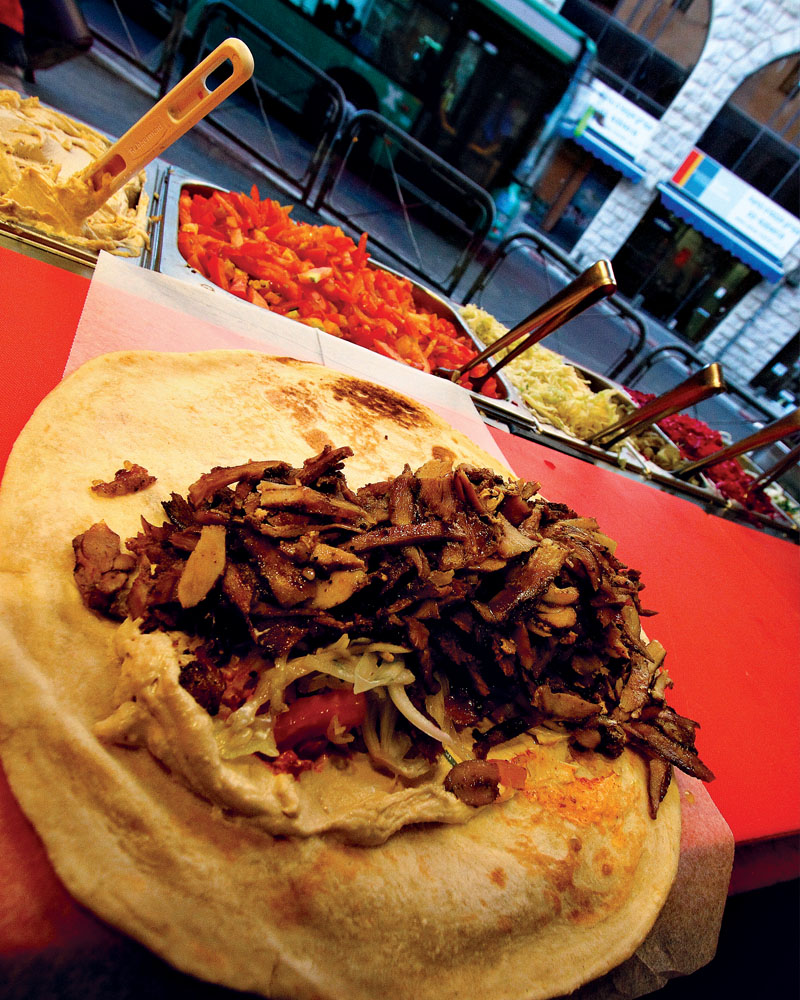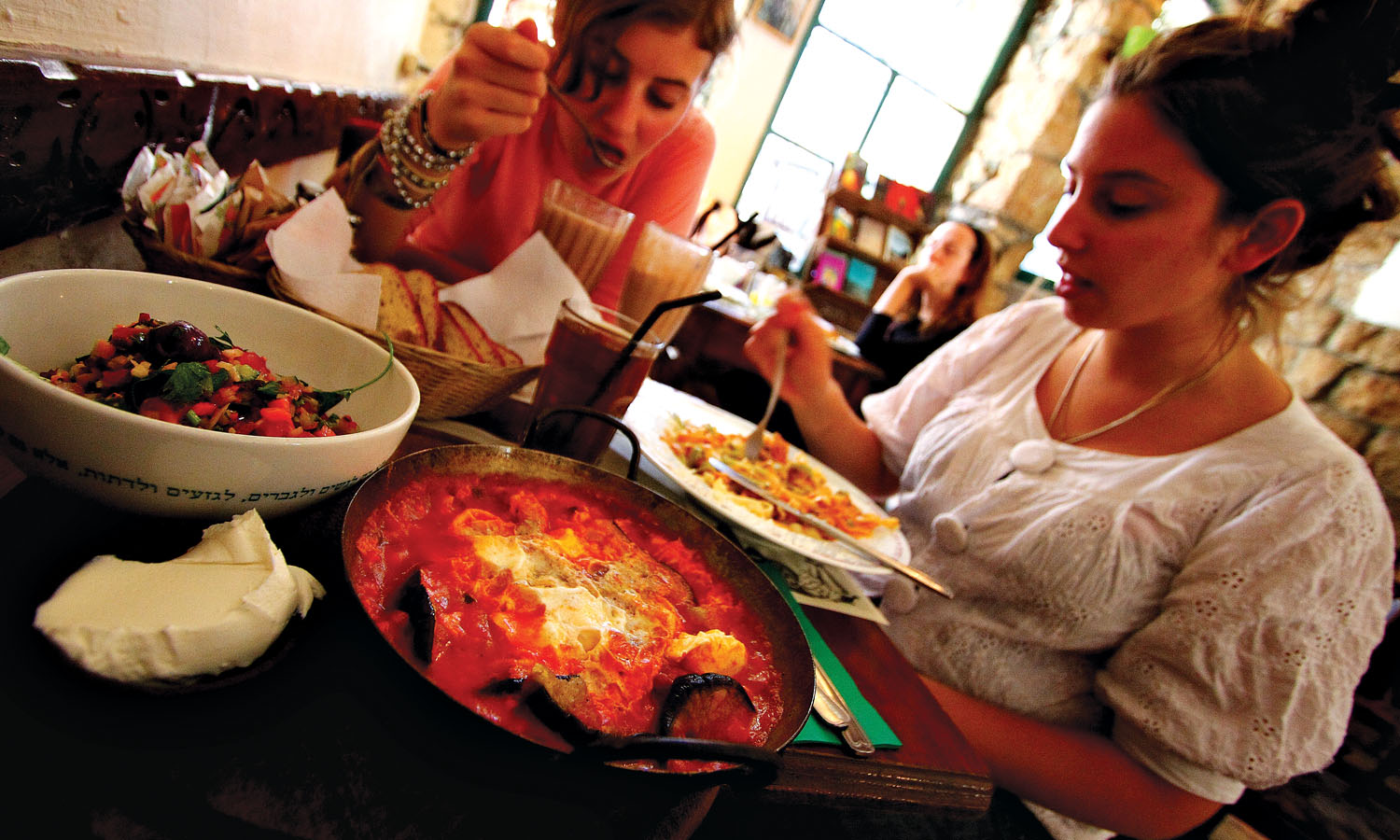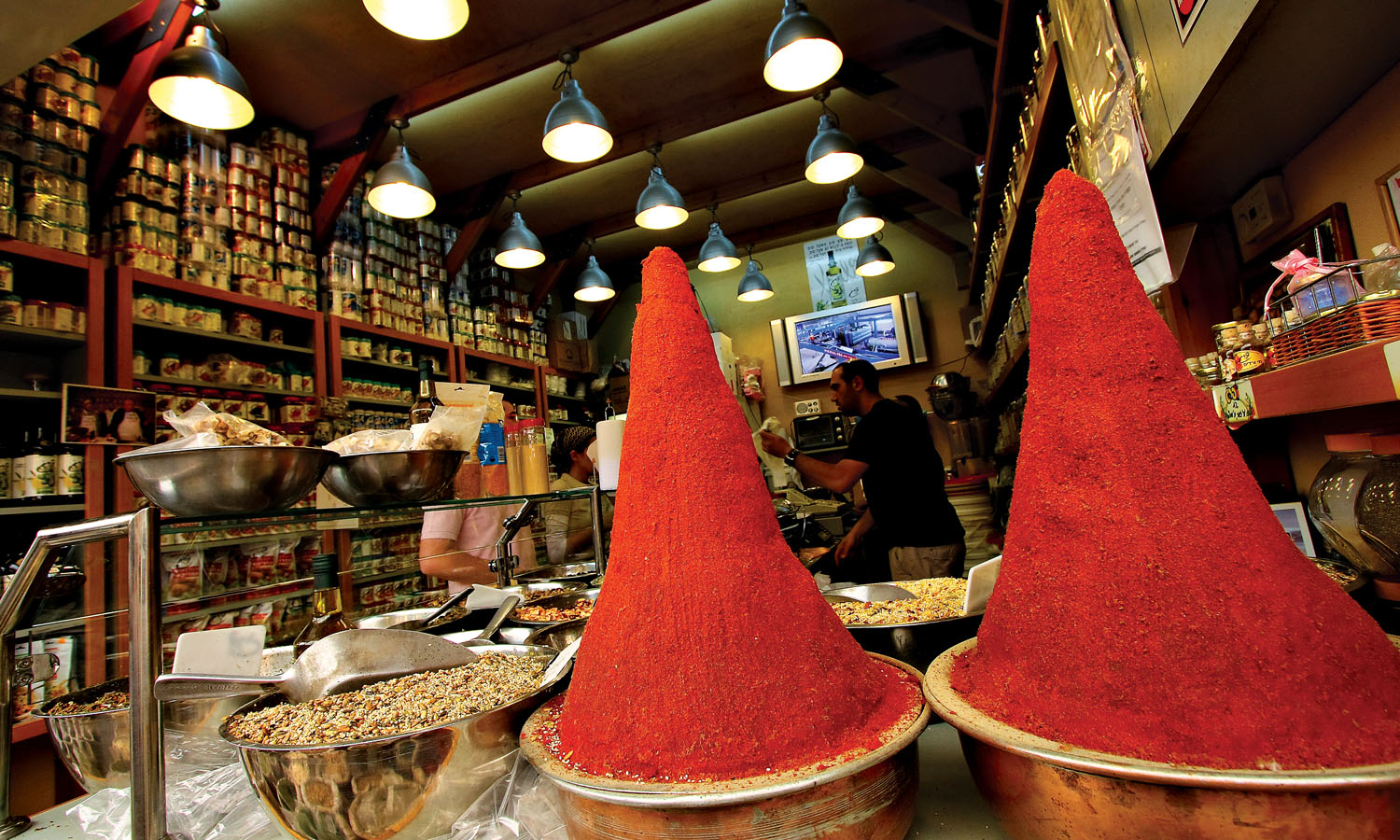
The diversity of immigrants to Israel has guaranteed a diverse culinary influence, but this can make the question of what constitutes Israeli cuisine a vexed one. Fortunately, indigenous dietary delights remain to be enjoyed in the Holy Land, especially in the capital Jerusalem.
State of the nation
If Israel had a national dish, it might well be hummus. This simple dip, composed primarily of crushed chickpeas and olive oil, is so popular in Israel that it’s become an ‘anytime meal’, a universal condiment and a serious point of discussion. Ask any Israeli where to get the best hummus and you should set aside an hour for the response.
Most agree that hummus is an Arab invention that has been appropriated by the Jewish majority and developed into an almost entirely different dish. Order a bowl of hummus at Akermawi in East Jerusalem and you’ll find it’s lemon-laced, dotted with cumin and as deliciously dense as setting concrete. This is the staple of many Palestinian workers who arrive before the crack of dawn to work in Israel. One large bowl is said to be sufficiently nutritious for a full day’s labour.
On the west side of town, the cumin and much of the lemon are absent and the hummus is soft and fluffy. This is because the Jewish establishments in West Jerusalem macerate the chickpeas in a blender, whereas the Muslim establishments in East Jerusalem pound them with a mortar and pestle.
The love of hummus spans cultural divides. Across the capital and the country it can be ordered plain or served with a sprinkling of meat, pinenuts, cooked whole chickpeas or ful (tangy, slow-cooked fava beans). Whatever the accompaniment, it is best eaten with pita. Arab-made pita tends to be slightly drier and more hummus-absorbent than the moister, stickier Jewish-made pita.
A flying start
There’s no better way to start the day than with a decent breakfast, which is rarely difficult in Israel. Make sure your breakfast is included in your accommodation, as this is a meal not to be missed. Depending on where you stay and how heavily your hosts lay on the morning meal, it is possible to stuff yourself to such an extent that hunger pangs will be at bay until late in the day.
While there’s usually no meat at breakfast owing to the Jewish dietary laws, or kashrut, that prohibit milk and meat being eaten together, there’s usually enough variety to compensate. A typical spread could comprise breads, pastries, fruits of all sorts, a selection of white cheeses (including the slightly sour Levantine delight, leben), muesli, hummus (of course), a tuna dip, Israeli salad (cucumber, tomato, olive oil, onion) and hard-boiled eggs.
In terms of hot breakfasts, one local favourite is shakshuka – a tomato, onion, chilli and capsicum casserole, served in the pan in which it’s cooked with an egg cracked on top. This rich Israeli version of baked eggs can also feature eggplant, goats’ cheese or other creative additions.
All things sugar and spice
Wandering through the Arab markets in the Old City of Jerusalem’s Muslim quarter, it is almost impossible not to be seduced by the syrupy pastries generically known as baklava. Beware the sweet aromas of knaffe, a cheese-filled syrup-drenched slice of sugary heaven. Explore the central Jerusalem market of Machane Yehuda and you will be drawn to sticky chocolate rugelach (croissant-like pastries), halva by the kilo and troughs of dates, dried fruit and nuts.
Snack time
Snacking is an important aspect of the Israeli diet and the country is well served by an endless array of brightly packaged junk food. Bissli are oily, MSG-laden fried chip-like things made from wheat, whereas Bamba is a ubiquitous peanut-based substance resembling disposable packing beans. An army of palm oil-soaked wafers covered in chocolate is available at every turn and hazelnut-rich chocolate is another snack-food staple.
If you have any appetite left after all this, you can’t leave Israel without trying a shawarma – what Australians would refer to as a kebab. Wherever you are in the country, from Akko in the north to Eilat in the extreme south, you’ll never be too far from a shawarma (which come with felafel for vegetarians). Debates still rage over where you’ll find the best examples, but HaShamen (The Fat One) on Ben Zakai Street in Jerusalem has incredibly succulent shawarma. Ask for one in laffa, a huge chunk of spongy bread with far greater capacity than a pita, and you’re guaranteed to be well satisfied.

Le’Chaim!
Alcohol is generally consumed in moderation in Israel and, at least by Australian standards, is relatively expensive. Nonetheless, there’s no shortage of tipple on offer when out and about. All your favourite cocktails share the bar with the full gamut of spirits and an acceptable selection of beer. Unfortunately, neither of the local varieties of beer, Maccabee and Goldstar, are particularly exciting – out of the two, my advice is to stick to the tolerable, malty Goldstar. The only Palestinian beer, Taybeh, is definitely worth a try, and is gaining popularity as the best of the bunch in this competitive corner of the Middle East.
Locally favoured spirits include Sabra, an Armenian brandy distilled from the prickly pear (also a nickname for an Israeli – spiky on the outside, soft on the inside) and arak, the aniseed-spiced liquor. Your best soft drink option is the mint-infused lemonade known as limonana, a refreshing homemade glass of which is commonplace around the country. Another sweet local beverage is the pink concoction of grapefruit and lemon juice available in trendier West Jerusalem hummus joints.
Hot drinks tend to be a choice between mint tea (a bag of black tea swimming in a forest of freshly picked mint) and one of four types of coffee. If you need a caffeine fix in Israel, you’ll need to be specific: ‘nes’ is instant coffee, usually Nescafe; ‘turki’ is thick, strong Turkish coffee boiled on the stove a few times; and ‘botz’ (‘mud’ in English) is the fine Turkish grind stirred into a glass of boiling water.
Espresso coffee, while available, isn’t always such a good option. For those who prefer their hot drinks without a sizeable lashing of caffeine, there’s always sahlab. This rosewater-infused, thin white porridge is distinctively Israeli. More of a dessert than a drink, it’s sometimes topped with coconut and is the best way to warm your soul late on a winter’s night.
Get Eating
If you arrive at Akermawi at 4:00am, you might have to elbow your way past the Palestinian workers for your bowl of hummus. Otherwise, turn up before 1:00pm and you’re in for a real treat.
Akermawi
Corner Musrara Street and Sultan Suleiman Street, East Jerusalem.
Get Cooking
New Israeli Food, by Janna Gur, profiles the state of the plate in the Holy Land and is packed with ripper recipes to bring the experience home. It does weigh two kilograms, but it’s a lot easier to get through customs than a shawarma.
Get Drinking
There are plenty of cool bars in Israel. Yellow Submarine is one Jerusalem joint with an alternative crowd and the kind of live music that’s likely to leave a lasting impression.
Yellow Submarine
13 Erkevim Street, Industrial Area,
Talpiyot, Jerusalem.
yellowsubmarine.org.il/en
 Get inforMed
Get inforMed
The Book of New Israeli Food: A Culinary Journey, by Janna Gur, profiles the state of the plate in the Holy Land and is packed with ripper recipes to bring the experience home. It does weigh two kilograms, but it’s a lot easier to get through customs than a shawarma.
amazon.com


